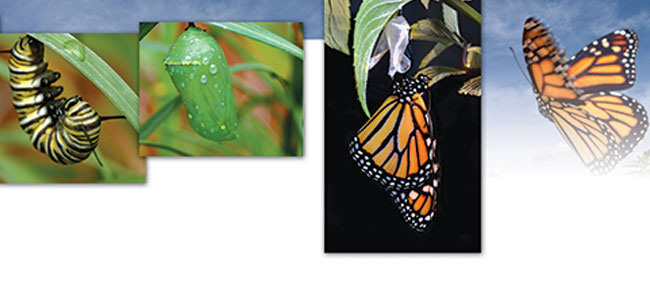July- September

Out of the egg of a certain insect comes a larva, the caterpillar which is well known and feared for its devouring appetite (Joel 1:4). The caterpillar is the second stage (the egg being the first) of a complete metamorphosis that will transform the worm into a much better form of life.
After voraciously eating for several days, the caterpillar matures and attaches itself to a strong branch to pupate. During that stage (pupa), the caterpillar (now a chrysalis), will make a protective envelope about itself, called a cocoon, in which it will stay during its pupation fasting. It fastens its hindmost feet securely with silk and makes a loop of a tough silk thread behind its body, fastening the ends to the support as a kind of safety belt. Most of the time, these creatures spend their winter as pupae to emerge from their cocoon in the following season as adult butterflies. This last stage is called “imago,” when the despiteful worm of the dust becomes an awesome beauty of the sky! What spiritual lessons can we learn from this significant transformation?
In Webster’s Dictionary the word “worm” is also defined as: “a human being who is an object of contempt, loathing, or pity.” In the Bible, the following questions were asked by Job: “How then can man be justified with God? or how can he be clean that is born of a woman? Behold even to the moon, and it shineth not; yea, the stars are not pure in his sight. How much less man, that is a worm? and the son of man, which is a worm?” (Job 25:4–6). Centuries later, the prophet Isaiah brought the answer: “Fear not, thou worm Jacob, and ye men of Israel; I will help thee, saith the Lord, and thy redeemer, the Holy One of Israel” (Isaiah 41:14). With the help of our Lord and by His grace, all human beings can escape their shameful condition if they are willing to go, like the caterpillar, through the process of pupation.
Several aspects of this transi–tional stage deserve our attention.
1. A Branch: Christ. To begin our Christian experience we need, like the caterpillar, a strong support. And we will find it in Jesus Christ, our righteous Branch: “Behold, the days come, saith the Lord, that I will raise unto David a righteous Branch, and a King shall reign and prosper, and shall execute judgment and justice in the earth. In his days Judah shall be saved, and Israel shall dwell safely: and this is his name whereby he shall be called, the lord our righteousness” (Jeremiah 23:5, 6). Christ supports us in all of our infirmities and builds around us a protective envelope to shield us from all harms and dangers.
2. A Safety belt: Prayer. The Bible advises us to “pray without ceasing” (1 Thessalonians 5:17), and the Spirit of Prophecy expounds on that topic as follow: “We cannot for one moment separate ourselves from Christ with safety. We may have His presence to attend us at every step, but only by observing the conditions which He has Himself laid down. . . .
“At the beginning of the day, do not, dear youth, neglect to pray earnestly to Jesus that He will impart to you strength and grace to resist the temptations of the enemy in whatsoever form they may come; and if you pray earnestly, in faith and contrition of soul, the Lord will hear your prayer. But you must watch as well as pray” (God’s Amazing Grace, p. 289). We need to pray especially to obtain power to master our appetite.
3. Fasting: Our Diet. During our “Christian pupation,” it is essential that we follow also the example of the fasting worm. But our fast doesn’t always mean a complete abstinence from food. The Spirit of Prophecy explains, “The true fasting which should be recommended to all is abstinence from every stimulating kind of food, and the proper use of wholesome, simple food, which God has provided in abundance. Men need to think less about what they shall eat and drink, of temporal food, and much more in regard to the food from heaven, that will give tone and vitality to the whole religious experience” (Counsels on Diet and Foods, p. 90). In other words, we should live like Daniel (see Daniel 1:8).
4. The pupal period: Our present life. Winter seems to be the best time for the caterpillar’s complete transformation. So it is likewise for us; however, our winter is not composed of merely a few months but rather of our entire lifetime here on earth. Inspiration tells us, “This life at best is but the Christian’s winter; and the bleak winds of winter—disappointments, losses, pain, and anguish—are our lot here; but our hopes are reaching forward to the Christian’s summer, when we shall change climate, leave all the wintry blasts and fierce tempests behind, and be taken to those mansions Jesus has gone to prepare for those that love Him” (The Review and Herald, November 7, 1878).
Finally, after holding onto Christ, abiding by His law, maintaining a vital communion with Him and practicing true fasting, we will be completely changed (see Romans 12:1, 2; 1 Corinthians 15:51, 52; 2 Corinthians 3:18; 5:17). The inspired pen explains: “By the power of His love, through obedience, fallen man, a worm of the dust, is to be transformed, fitted to be a member of the heavenly family, a companion through eternal ages of God and Christ and the holy angels. Heaven will triumph, for the vacancies made by the fall of Satan and his host will be filled by the redeemed of the Lord” (The Upward Look, p. 61). Would you start the process of your transformation now?